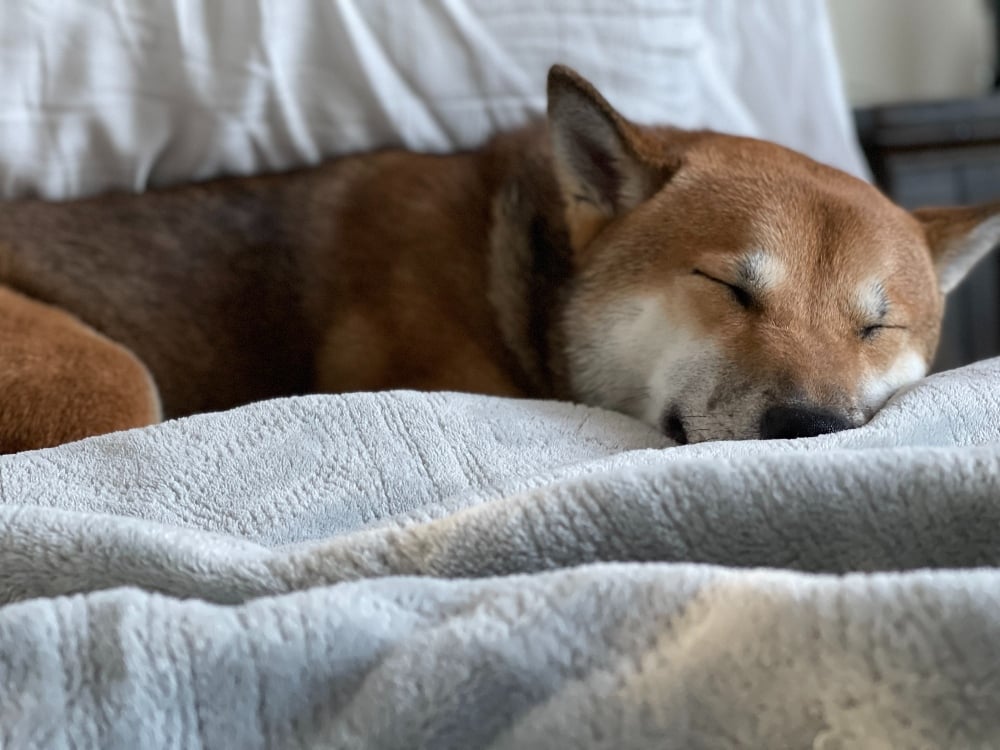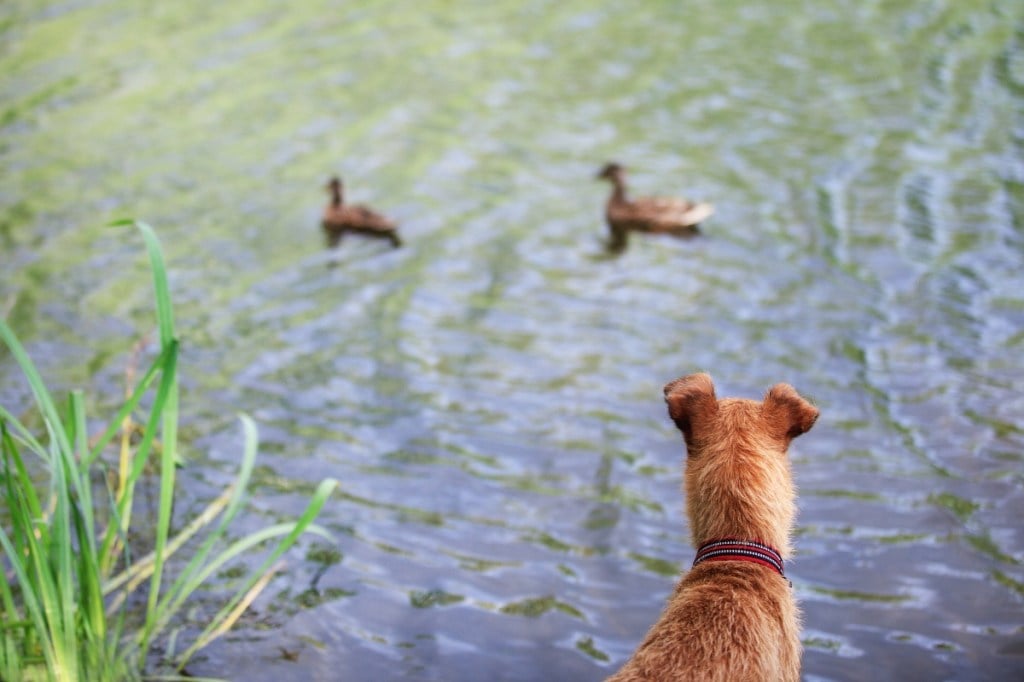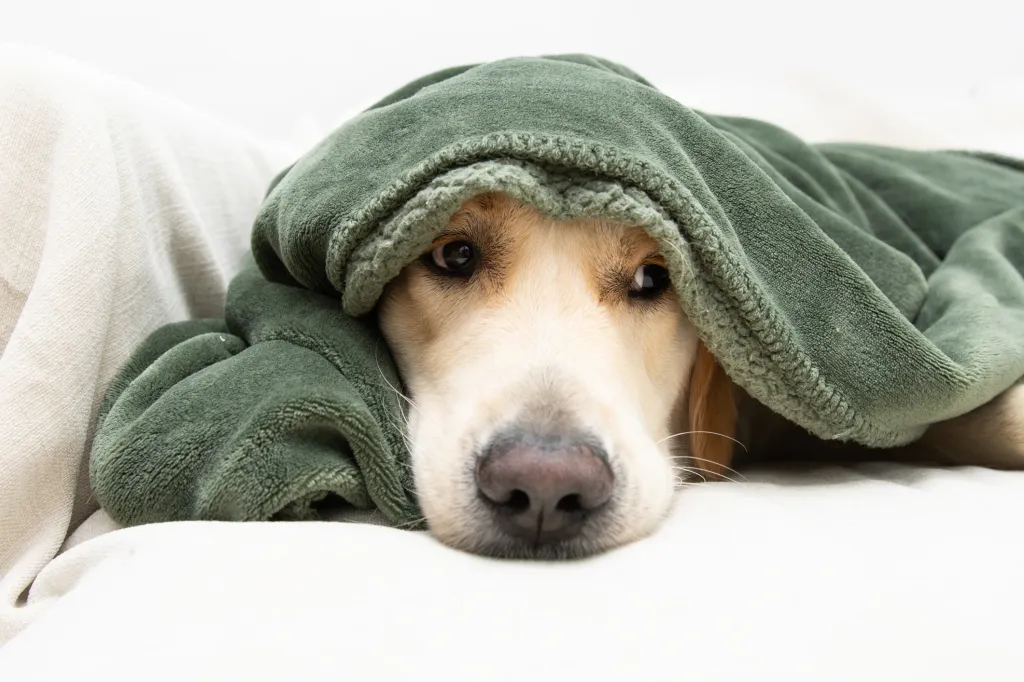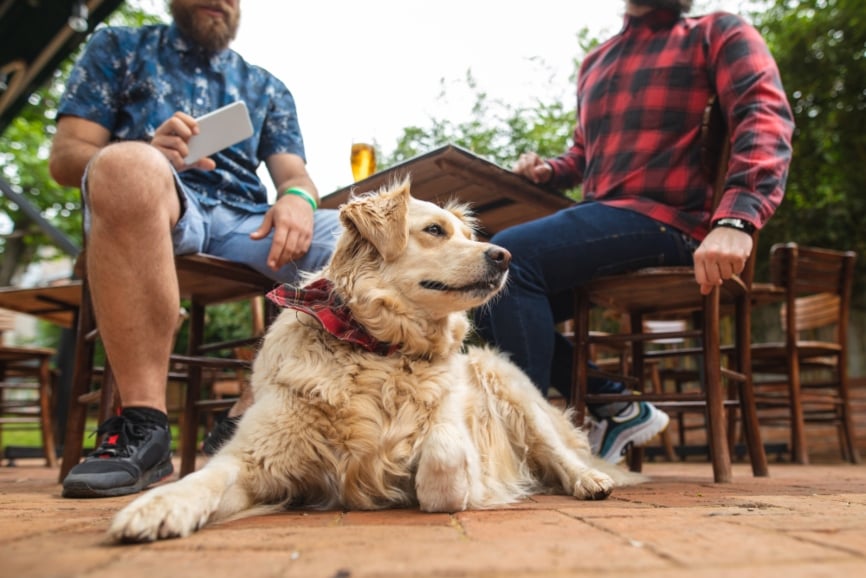Table of Contents
As I write this article, there’s a dog curled up at my feet for his daily mid-morning snooze. Given that he sleeps just as many hours as I do at night, I’m always impressed by his ability to nap so readily during the day. He’ll wake up if he hears his name or if a delivery vehicle drives down our street. But, if there’s nothing interesting going on, he’s often happy to sleep through most of the day.
It’s natural to wonder whether your dog is sleeping too much, too little, or just the right amount. In this article, we’ll discuss typical canine sleep habits and what you should do if you suspect a sleep problem.
How many hours does an average dog sleep each day?
An average adult dog sleeps anywhere from 10-14 hours per day.
In contrast, humans typically sleep just 7-8 hours per day. Even if your dog goes to bed at the same time as you and wakes up with your alarm clock, you can expect that your dog may nap up to seven additional hours during the course of the day.
The champion nappers of the pet world are cats, who tend to sleep anywhere from 15-20 hours per day!
Sleep habits change over your dog’s lifespan
Growing puppies need lots of sleep because much of their energy is directed toward healthy growth and development. In the early weeks and months of life, a puppy may sleep up to 22 hours per day. Puppies often sleep for long periods of time, wake up for a brief period to eat, play, go potty, and then fall right back asleep.
As they mature, puppies begin to stay awake for progressively longer amounts of time. The precise amount of sleep they need varies based upon their developmental stage and activity level, but the general trend as puppies age will be towards less sleeping and more awake time.
Most adult dogs sleep primarily during the overnight hours while their owners sleep. During the day, they often alternate between periods of sleeping and napping. Dogs may sleep more when left home alone, spending more time awake when their owners are available for interaction.
Abnormal sleep in dogs
If your dog appears to be sleeping too much or too little, or you notice any other significant change in your dog’s sleep habits, it’s time for a visit to your veterinarian. There are numerous medical conditions that can cause lethargy in dogs, leading to increased sleep. Similarly, a number of conditions may cause your dog to be restless and unable to sleep.
Your veterinarian will likely perform a thorough physical examination, followed by some laboratory tests. An examination is used to detect painful conditions that could interfere with sleep. Blood tests and a urinalysis screen for metabolic diseases that can interfere with healthy canine sleep habits.
If your dog receives a clean bill of health from your veterinarian, focus on your dog’s routines and environment. Give your dog plenty of exercise and activity during the day, so they will be tired at night. Be sure your dog has a comfy bed for sleeping, away from noisy, high-traffic areas of your home. Keep your home at a comfortable temperature for your dog – small breeds often prefer warmer temperatures, while large-breed dogs like cooler temperatures. Finally, allow your dog to rest in an area that is free of distractions. These steps can boost your dog’s likelihood of obtaining quality, restful sleep.
Sleep disorders in dogs
Although canine sleep disorders are uncommon, they can occur.
There are three primary sleep disorders in dogs:
- Narcolepsy: Dogs with narcolepsy fall asleep suddenly, and they may do so randomly or in response to certain triggers. These dogs typically remain asleep (unable to be woken) for several seconds, then wake up and quickly return to normal. Narcolepsy is an inherited condition in Dachshunds, Doberman Pinschers, Labrador Retrievers, and Poodles.
- REM sleep disorder: Similar to sleepwalking in humans, REM sleep disorder results in abnormal movements during sleep in dogs. Some movement during dreaming is normal, but these dogs may walk, roll, or thrash around in their sleep.
- Sleep breathing disorder (sleep apnea): This condition is most common in Bulldogs, Boxers, Pugs, and other brachycephalic (squished-face) breeds. When sleeping, these dogs may struggle to take in adequate oxygen, causing them to wake up and reposition themselves.
If your dog shows signs of a sleep disorder, consult your veterinarian.
Summary
In most cases, healthy dogs sleep all night long and doze on and off throughout the day. Some dogs sleep more than others, but this variation is usually subtle and not a cause for concern. However, if your dog’s sleep patterns change dramatically or if your dog is showing signs of a sleep disorder, a veterinary workup is recommended. Talk to your veterinarian to determine the best steps for your dog.








